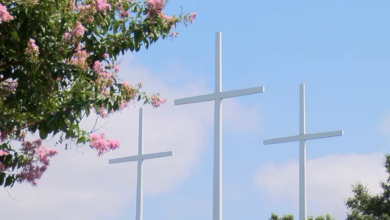Joy, bread, ‘a lot of strength’ among wishes to Uruguay goddess

By Alejandro Prieto
Montevideo, Feb 2 (EFE).- Wishes for health topped the requests to Lemanja, Uruguay’s water goddess of the Afro Umbanda religion, in a year in which believers brought their natural offerings to the country’s beaches again and asked for “a lot of strength” to face the ongoing pandemic.
Filled by countless bathers and water sports fans who crowd them up every summer, waters of the Uruguayan coast receive a visit that is as numerous as it is special every Feb. 2.
This is the day thousands of followers of the Umbanda religion demonstrate, as the Africans did in ancient times in the Nigerian river Kuta, where the first worship of the goddess was given, their devotion to the mother of the oceans.
After the forced suspension of the movement in 2021, when deaths and admissions to hospitals due to Covid-19 increased, Afroumbandists are cautiously experiencing the arrival of a new Lemanja day.
This is according to Susana Andrade, a Mae (priestess) and referent of the Afroumbandist Federated Institution of Uruguay, who said the group takes its precautions since, although there are no mobility restrictions, the omicron variant has notably raised the daily number of cases in the country.
The institution said not to convene at the beach at specific times to avoid crowds and implement social distancing measures, hand hygiene and the use of masks. Andrade said these should be the initiative of each person.
“Lemanjá is not going to come down to put on a mask, we have to be aware that we are a religion that seeks the well-being of people in life, in the terrestrial passage,” she said, adding that since Uruguay is “sprinkled with coasts” there is no need to “crowd” on a single beach.
Thousands filled Ramirez beach, one of the main and busiest in the Uruguayan capital, distinguished among devotees of religion with their traditional white clothing and necklaces with colors alluding to the goddess and approaching the waters to deliver their offerings.
Songs, capoeira and free healing and spiritual cleansing rites took place and culminated with the characteristic sunset that illuminates the south and east coast of the South American country in gold.
While in 2021 the day was celebrated through “Lemanjá solidarity,” a charitable initiative to collect food for those in need during the pandemic, Andrade said that this year there will also be parallel activities.
The Mae said this help is maintained in the religion’s temples, arranged in the houses of some faithful people. Her book “Macumberos” was presented Tuesday, seeking to demolish myths and stigmas about the Afro-Umbandista community in Uruguay.
According to the referent, the “demonization” that the white, European and Catholic culture made of the beliefs of African origin led to discrimination with serious consequences persisting to this day.
“That has meant that even today more whites than blacks practice it in Uruguay and the book invites us to overcome these fears, these myths,” she said. EFE
ap/lds





